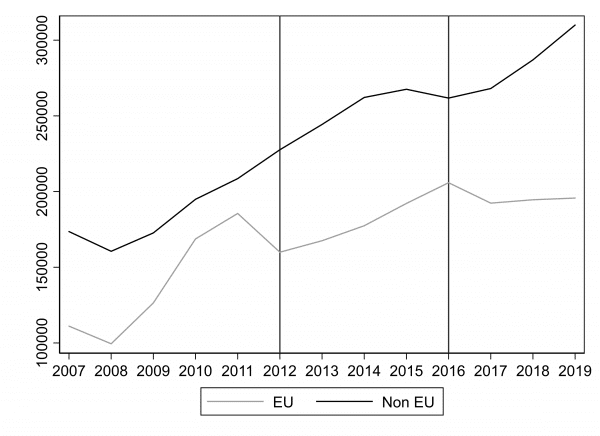Over the past year, Agnese Romiti from the Department of Economics at the University of Strathclyde and Catalina Amuedo-Dorantes from the University of California-Merced have been working on a project examining the effect of the Brexit referendum held in 2016 on university applications from EU students.
If you’re interested in reading the academic paper based on this work, this is available as a discussion paper here.
International students in the UK
The UK is ranked second after the US in hosting international students. Before the Brexit referendum, international students represented 14 percent of undergraduate students and 35 of postgraduate students in the UK. Approximately 36 percent of international undergraduate students were from the EU (HESA, 2016). Therefore, attracting international students is of utmost importance, especially for public universities increasingly facing funding cuts, as students represent an important source of revenue. It is also vital in enticing and retaining foreign talent critical in fostering innovation and productivity. Finally, attracting younger cohorts is also important in light of demographic trends that the UK has been recently experiencing, as evidenced by a shrinking 18-years-old British population linked to recent declines in enrolments of UK students in undergraduate programs (UCAS, 2017).
How might Brexit alter international student applications?
On June 23, 2016, the people of the UK voted to leave the European Union (EU). In March 2017, the UK Parliament confirmed the result of the referendum. After a long exit negotiation process, the UK officially left the EU in January 2020. One of the hallmarks of the EU is the free movement of people and labour between member countries. Brexit implied an eventual end to this mobility for most European migrants, and it ultimately affected the costs of studying in the UK by modifying students’ ability to secure loans, introducing visa requirements, and increasing uncertainty on international students’ ability to stay in the country and seek employment after completion of their studies.
This higher implicit economic cost could deter prospective students from considering studying in the UK in the first place. In addition, aside from any economic costs, Brexit could also deter prospective students from attending college in a country they feel is no longer welcoming migrants or discouraging them from remaining in the country after completion of their studies.
UCAS Data
For our analysis, we use administrative data on the universe of applications to undergraduate programs in the UK from the Universities and Colleges Admissions Service (UCAS) over the 2013 through 2019 period. UCAS is the body that manages all applications to undergraduate courses in the UK. We consider the number of applications by university, subject, country of origin and year.
Our findings
Descriptive evidence shows that international student applications to UK universities from EU students dropped by 5 percent after 2016, whereas applications from non-EU students rose by 18% (Figure 1). Both exhibited a somewhat parallel upward trend from 2012 through 2016 (after the increase in tuition fees in 2012 dampened EU applications.
Figure 1: Total Applications by Student Origin and Over Time

Notes: This figure shows total applications by EU vs non-EU group over time. Source: UCAS
This evidence, while revealing, is merely descriptive. Therefore, we adopt a method widely used in policy evaluation that compares changes in international student applications from EU member countries within source country, university, and subject of study to those from non-EU members, pre- vs. post-UK’s vote to leave the EU. In this manner, we can gauge the effect of Brexit on international student applications net of both pre-existing differences between EU and non-EU countries, and other confounding changes affecting equally both groups over the same time span.
We find that Brexit has significantly lowered applications originating from EU students. Specifically, when compared to international student applications from non-EU students, the growth rate of EU applications dropped by seven percent following the Brexit referendum. Additionally, we rule out anticipation effects as changes in the volume of international student applications from the EU did not precede the Brexit referendum; rather, they occurred right after, persisting during the 3-year period that followed.
Importantly, the effect of Brexit varies by subject of study with applications for STEM subjects declined the most, by 10 percent. These finding hints at positive selected prospective students choosing to apply elsewhere.
Finally, we also find evidence of substantive drops in international student enrolments in addition to applications, substantiating concerns regarding the ability to attract international talent.
What might be driving the observed changes in the volume of applications?
We explore two potential explanations for our findings. First, we consider the role played by psychological factors, as captured by a potentially unfriendly environment towards EU residents after Brexit, in shaping international student applications. Secondly, we ponder the role of economic factors –most notably, the curtailed ability for international students to stay long term in the UK upon completion of their studies to find employment. We find that the impact of Brexit has been rather homogeneous across UK regions, regardless of whether they voted to leave or to remain in the EU. This finding is either suggestive of concerns regarding possible xenophobic sentiments not playing much of a role in shaping international students’ decision or, alternatively, of students’ unawareness of differences in how various UK regions voted. However, economic factors might have, as evidenced by the fact that Brexit curtailed international student applications the most among EU students from countries with lower per capita GDP and employment rates. Those are students who would have had more to gain and, in turn, been presumably more interested in staying in the UK after completion of their studies to live and work.
Policy Implications
Our findings regarding the impact of Brexit on international student applications are worrisome. Impacts are non-negligible and, ultimately, result in lower international student enrolments. Furthermore, the results are suggestive of student selection patterns that can have significant implications for innovation and economic growth. Given the contributions of international student exchanges to economic activity, research, and development, as well as the prominent standing of the UK as the second most frequent destination for international students, particularly from EU country members, further research on the implications of Brexit for UK universities and the ability to attract and retain valuable talent is well-warranted. Their contributions, both demographically and economically, can prove key in fostering a young, vibrant, and diverse society.
Authors

Agnese Romiti
Dr Agnese Romiti is a lecturer in economics at the University of Strathclyde
Catalina Amuedo-Dorantes
Dr. Catalina Amuedo-Dorantes is Professor of Economics at University of California, Merced
